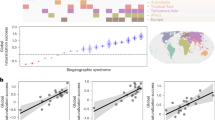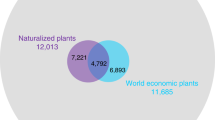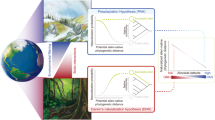Abstract
Naturalized plants can have a significant ecological and economic impact1, yet they comprise only a fraction of the plant species introduced into new areas by humans2. Darwin proposed3 that introduced plant species will be less likely to establish a self-sustaining wild population in places with congeneric native species because the introduced plants have to compete with their close native relatives, or are more likely to be attacked by native herbivores or pathogens4,5, a theory known as Darwin's naturalization hypothesis6. Here we analyse a complete list of seed-plant species that have been introduced to New Zealand and find that those with congeneric relatives are significantly more, not less, likely to naturalize — perhaps because they share with their native relatives traits that pre-adapt them to their new environment.
This is a preview of subscription content, access via your institution
Access options
Subscribe to this journal
Receive 51 print issues and online access
$199.00 per year
only $3.90 per issue
Buy this article
- Purchase on Springer Link
- Instant access to full article PDF
Prices may be subject to local taxes which are calculated during checkout
Similar content being viewed by others
References
Vitousek, P. M., D'Antonio, C. M., Loope, L. L., Rejmánek, M. & Westbrooks, R. NZ J. Ecol. 21, 1–16 (1997).
Williamson, M. Biological Invasions (Chapman & Hall, London, 1996).
Darwin, C. On the Origin of Species (Murray, London, 1859).
Rejmánek, M. in Invasive Species and Biodiversity Management (eds Sandlund, O. T., Schei, P. J. & Viken, A.) 79–102 (Kluwer Academic, Dordrecht, 1999).
Mack, R. N. in Weeds in a Changing World (ed. Stirton, C. H.) 65–76 (British Crop Protection Council Symp. Proc. 64, Farnham, 7 1995).
Daehler, C. C. Am. Nat. 158, 324–330 (2001).
Jackson, B. D. et al. Index Kewensis Plantarum Phanerogamarum (Clarendon, Oxford, 1895).
Mabberley, D. J. The Plant Book: A Portable Dictionary of the Higher Plants (Cambridge Univ. Press, Cambridge, 1987).
Heenan, P. B., Breitwieser, I., Glenny, D. S., de Lange, P. J. & Brownsey, P. J. NZ J. Bot. 36, 155–162 (1998).
SAS Institute. SAS/STAT Version 8 (SAS Institute, Cary, North Carolina, 1999).
Webb, C. O. Am. Nat. 156, 145–155 (2000).
Williams, C. B. J. Anim. Ecol. 16, 11–18 (1947).
Author information
Authors and Affiliations
Corresponding author
Ethics declarations
Competing interests
The authors declare no competing financial interests.
Rights and permissions
About this article
Cite this article
Duncan, R., Williams, P. Darwin's naturalization hypothesis challenged. Nature 417, 608–609 (2002). https://doi.org/10.1038/417608a
Issue Date:
DOI: https://doi.org/10.1038/417608a
This article is cited by
-
Global freshwater fish invasion linked to the presence of closely related species
Nature Communications (2024)
-
Non-native fishes in Brazilian freshwaters: identifying biases and gaps in ecological research
Biological Invasions (2023)
-
Clonal integration facilitates higher resistance to potentially toxic element stress in invasive alien plants than in natives
Plant and Soil (2023)
-
Alternative stable ecological states observed after a biological invasion
Scientific Reports (2022)
-
The role of phylogenetic relatedness on alien plant success depends on the stage of invasion
Nature Plants (2022)
Comments
By submitting a comment you agree to abide by our Terms and Community Guidelines. If you find something abusive or that does not comply with our terms or guidelines please flag it as inappropriate.



